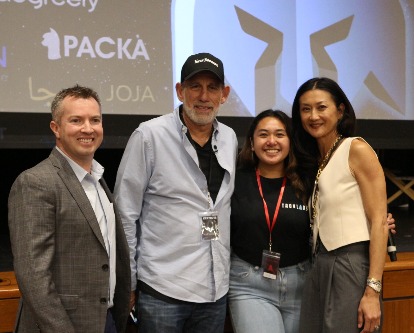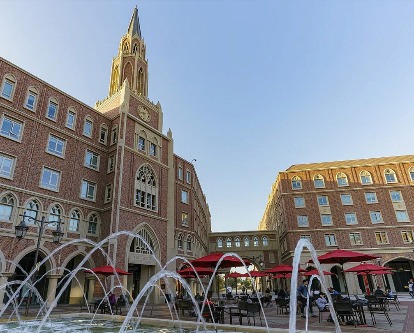 Even as she helped to promote two organic food brands at one of the globe’s largest packaged food companies, Madeline Robbins MBA ’22 felt disenchanted at the momentum and investment her multinational enterprise devoted to sustainability. Although she relished the opportunity to sell “greener” products, she was frustrated that the KPI (key performance indicator) driving decision making was largely sales rather than understanding how sustainability and sales were interconnected.
Even as she helped to promote two organic food brands at one of the globe’s largest packaged food companies, Madeline Robbins MBA ’22 felt disenchanted at the momentum and investment her multinational enterprise devoted to sustainability. Although she relished the opportunity to sell “greener” products, she was frustrated that the KPI (key performance indicator) driving decision making was largely sales rather than understanding how sustainability and sales were interconnected.
“It felt like I was hitting a brick wall, that the buy-in and belief behind truly sustainable actions and decisions wasn’t what it could’ve been or should’ve been,” said Robbins, who pursued an MBA at USC’s Marshall School of Business in hopes that a richer understanding of business, especially when applied through a sustainable lens, could propel positive change. “For me, the future of business is the same as the future of the planet.”
Though few draw a straight line from business schools to sustainability education, times are changing. Student and faculty interest on topics such as environmentalism, impact investing and social entrepreneurship continues to swell alongside public pressure on companies to improve on the value they deliver not only to shareholders but also to the environment, their employees and the communities in which they operate. As buzzy terms like CSR (corporate social responsibility) and ESG (environmental, social, governance) gain attention in the C-suite, it’s increasingly clear more needs to happen at the business school level where the business leaders of tomorrow receive their training.
“Sustainability will be baked into your job alongside your other responsibilities. It will be another dimension on which your performance is evaluated, just another KPI,”— Paul Adler, professor of management and organization
Paul Adler, the Harold Quinton Chair in Business Policy, likens sustainability in business schools today to where international business was 50 years ago or e-commerce two decades ago—that is, a niche curiosity, not an essential element in most courses. To prepare students for the contemporary world and what lies ahead, however, Adler said business schools must be more responsive and forward thinking.
“Sustainability will be baked into your job alongside your other responsibilities. It will be another dimension on which your performance is evaluated, just another KPI,” said Adler, a professor of management and organization with joint appointments in Sociology and Environmental Studies at USC.
It is why Adler and others, encouraged by a sustainability-minded focus championed by USC President Carol Folt and Marshall Dean Geoff Garrett, are working to strengthen the school’s sustainability curriculum. In arming students—undergraduates as well as MBAs—with fluency in sustainability topics, Marshall can cultivate prepared and responsive business leaders.
“Business is pushing for this, USC is pushing for this and Marshall is responding,” Adler said.
Student Demand is Growing
At present, Marshall’s sustainability offerings could be defined as an area of opportunity.
Marshall hosts 15 graduate and eight undergraduate courses related to sustainability broadly constructed. Some offer an environmental focus, such as Jeremy Dann’s course in Green Entrepreneurship and Adler’s MBA offering titled Environmental Sustainability and Competitive Advantage. Others focus on the social dimensions of sustainability, examining topics such as ethics and diversity, equity and inclusion (DEI).
Those 15 graduate courses trail the tally offered by many peer institutions. According to an analysis of MBA programs’ impact curriculum conducted by Marshall Net Impact (MNI), the Marshall-based chapter of a national organization dedicated to promoting socially responsible business practices at many top business schools. By contrast, New York Stern and MIT Sloan have 35 and 34 sustainability-centered courses, respectively. Stanford, Columbia, Northwestern Kellogg, Yale School of Management and UCLA Anderson each claim at least 20 courses as well.
“Students get it. They understand they’ll be the ones making decisions and know the impact they can have if they are aware of the issues.”—Greys Sošić, chair and professor of data sciences and operations
To be certain, sustainability issues do weave into Marshall courses focused on operations, supply chain, strategy, and other core business areas. In his global strategy MBA course, for example, Shon Hiatt introduces cases designed to motivate analyses of environmental concerns as well as business development objectives. In one such example, he cites a Chilean energy company looking to build dams in the Patagonia.
“Chile needs an alternative energy source because it is a coal-dependent country, but the Patagonia is also a natural treasure, so what do we do?” asked Hiatt, an associate professor of management and organization. “It’s a strategy discussion, of course, but one in which developing a solution is far more nuanced.”
By and large, students recognize the importance of social impact topics in the contemporary business world, which has heightened interest in learning about such topics.
“I think the vast majority of business school students understand there are new expectations for business today, that it’s not just about selling products and services,” said Robbins, MNI’s outgoing president. “Students realize that sustainability is going to touch their work one way or another and that their education will be incomplete without a grounding in these issues.”
Forward Thinking
It's slow going—such is the nature of academia. But there is movement.
Headed by Adler and Brittingham Social Enterprise Lab founder Adlai Wertman, Marshall’s Business, Society and Sustainability faculty working group launched in February with the blessing of Dean Garrett. The 18-member group is presently exploring how Marshall might elevate sustainability across its existing programs.
“Sustainability is a skill set, a language, a mindset everybody in business is expected to have now. Businesses are thinking about and reporting on these issues, so they are topics we need to teach our students to prepare them for life in business.”—Adlai Wertman, David C. Bohnett Professor of Social Entrepreneurship
There is, for example, discussion around offering support to faculty looking to incorporate sustainability issues into the classroom as well as constructing an undergraduate minor in sustainability from both current and in-development courses. Members also hope to connect with current business leaders to collect their perspectives on the most in-demand ESG competencies.
“Sustainability is a skill set, a language, a mindset everybody in business is expected to have now,” Wertman said. “Businesses are thinking about and reporting on these issues, so they are topics we need to teach our students to prepare them for life in business.”
One example of new curriculum being developed in this vein is ACCT 599: Sustainability Reporting and Analysis, which analyzes new and developing sustainability reporting standards, key sustainability metrics and GHG (greenhouse gas) accounting.
“In order to avoid being accused of ‘greenwashing,’ businesses that say they are committed to environmental, social and governance issues should follow accepted standards for reporting their efforts and outcomes,” said Richard Sloan, Deloitte and Touche LLP Chair in Accounting, and professor of accounting, finance and business economics, who is developing the curriculum along with Patricia Dechow, Robert R. Dockson Professor of Business Administration and Professor of Accounting, Finance and Business Economics.
MNI, meanwhile, has suggested adding sustainability themes into core Marshall courses around strategy, corporate finance, marketing, operations, leadership and other core business competencies. The student organization also suggested Marshall leadership investigate the possibility of a dual-degree program with USC’s Sol Price School of Public Policy. MNI points to existing overlap in coursework with Price and cites numerous peer institutions, including UCLA, Stanford, and UC Berkeley, already offering similar programs.
“Students get it,” said Greys Sošić, chair of the Department of Data Sciences and Operations, who teaches a course titled Sustainable Supply Chains. “They understand they’ll be the ones making decisions and know the impact they can have if they are aware of the issues.”
Adler suggested the need to incorporate sustainability into the curriculum runs even deeper.
“As citizens, we are all called on to express our views regarding various public policy aspects of sustainability,” Adler said. “And Marshall, after all, is educating citizens as well as business leaders.”
Read more about Paul Adler, Shon Hiatt, and Greys Sošić.




